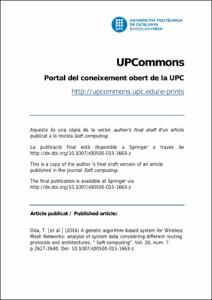Mostra el registre d'ítem simple
A genetic algorithm-based system for Wireless Mesh Networks: analysis of system data considering different routing protocols and architectures
| dc.contributor.author | Oda, Tetsuya |
| dc.contributor.author | Elmazi, Donald |
| dc.contributor.author | Barolli, Admir |
| dc.contributor.author | Sakamoto, Shinji |
| dc.contributor.author | Barolli, Leonard |
| dc.contributor.author | Xhafa Xhafa, Fatos |
| dc.contributor.other | Universitat Politècnica de Catalunya. Departament de Ciències de la Computació |
| dc.date.accessioned | 2017-02-09T10:35:04Z |
| dc.date.available | 2017-07-01T00:30:40Z |
| dc.date.issued | 2016-07-01 |
| dc.identifier.citation | Oda, T., Elmazi, D., Barolli, A., Sakamoto, S., Barolli, L., Xhafa, F. A genetic algorithm-based system for Wireless Mesh Networks: analysis of system data considering different routing protocols and architectures. "Soft computing", 1 Juliol 2016, vol. 20, núm. 7, p. 2627-2640. |
| dc.identifier.issn | 1432-7643 |
| dc.identifier.uri | http://hdl.handle.net/2117/100749 |
| dc.description | This is a copy of the author 's final draft version of an article published in the journal Soft computing. The final publication is available at Springer via http://dx.doi.org/10.1007/s00500-015-1663-z |
| dc.description.abstract | Wireless mesh networks (WMNs) are attracting a lot of attention from wireless network researchers. Node placement problems have been investigated for a long time in the optimization field due to numerous applications in location science. In our previous work, we evaluated WMN-GA system which is based on genetic algorithms (GAs) to find an optimal location assignment for mesh routers. In this paper, we evaluate the performance of four different distributions of mesh clients for two WMN architectures considering throughput, delay and energy metrics. For simulations, we used ns-3, optimized link state routing (OLSR) and hybrid wireless mesh protocols (HWMP). We compare the performance for Normal, Uniform, Exponential and Weibull distributions of mesh clients by sending multiple constant bit rate flows in the network. The simulation results show that for HWM protocol the throughput of Uniform distribution is higher than other distributions. However, for OLSR protocol, the throughput of Exponential distribution is better than other distributions. For both protocols, the delay and remaining energy are better for Weibull distribution. |
| dc.format.extent | 14 p. |
| dc.language.iso | eng |
| dc.publisher | Springer |
| dc.subject | Àrees temàtiques de la UPC::Enginyeria de la telecomunicació::Telemàtica i xarxes d'ordinadors |
| dc.subject | Àrees temàtiques de la UPC::Informàtica |
| dc.subject.lcsh | Wireless communication systems |
| dc.subject.lcsh | Computer algorithms |
| dc.subject.lcsh | Computer network protocols |
| dc.subject.other | Wireless mesh networks |
| dc.subject.other | Genetic algorithms |
| dc.subject.other | ns-3 |
| dc.subject.other | OLSR |
| dc.subject.other | HWMP |
| dc.subject.other | Giant component |
| dc.subject.other | User coverage |
| dc.title | A genetic algorithm-based system for Wireless Mesh Networks: analysis of system data considering different routing protocols and architectures |
| dc.type | Article |
| dc.subject.lemac | Comunicació sense fil, Sistemes de |
| dc.subject.lemac | Algorismes genètics |
| dc.subject.lemac | Protocols de xarxes d'ordinadors |
| dc.identifier.doi | 10.1007/s00500-015-1663-z |
| dc.description.peerreviewed | Peer Reviewed |
| dc.relation.publisherversion | http://link.springer.com/article/10.1007%2Fs00500-015-1663-z |
| dc.rights.access | Open Access |
| local.identifier.drac | 18813785 |
| dc.description.version | Postprint (author's final draft) |
| local.citation.author | Oda, T.; Elmazi, D.; Barolli, A.; Sakamoto, S.; Barolli, L.; Xhafa, F. |
| local.citation.publicationName | Soft computing |
| local.citation.volume | 20 |
| local.citation.number | 7 |
| local.citation.startingPage | 2627 |
| local.citation.endingPage | 2640 |
Fitxers d'aquest items
Aquest ítem apareix a les col·leccions següents
-
Articles de revista [1.049]


